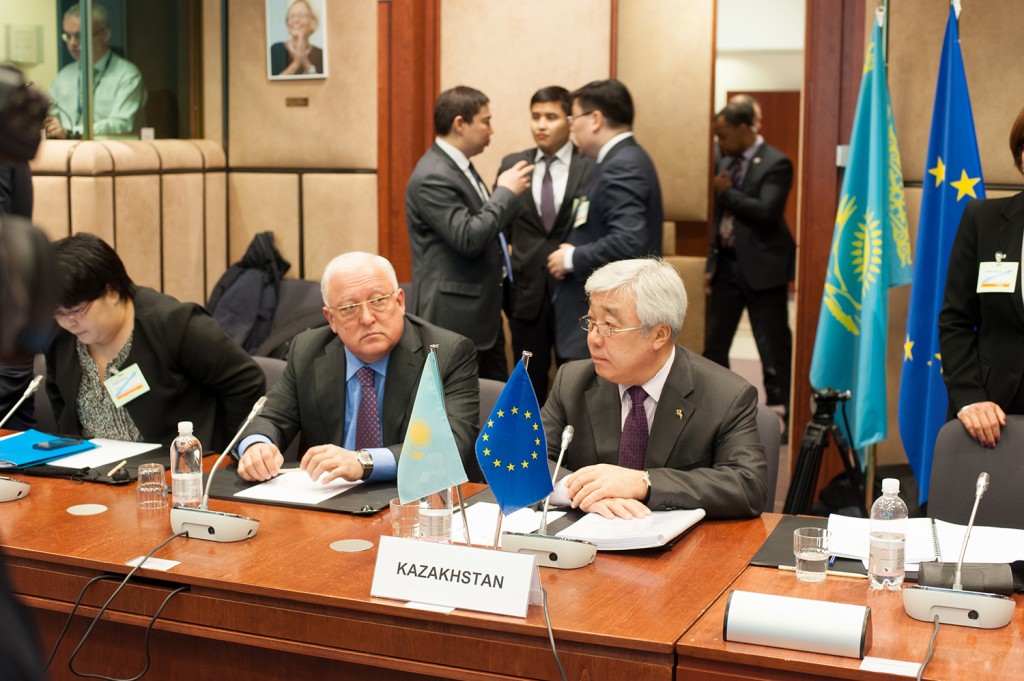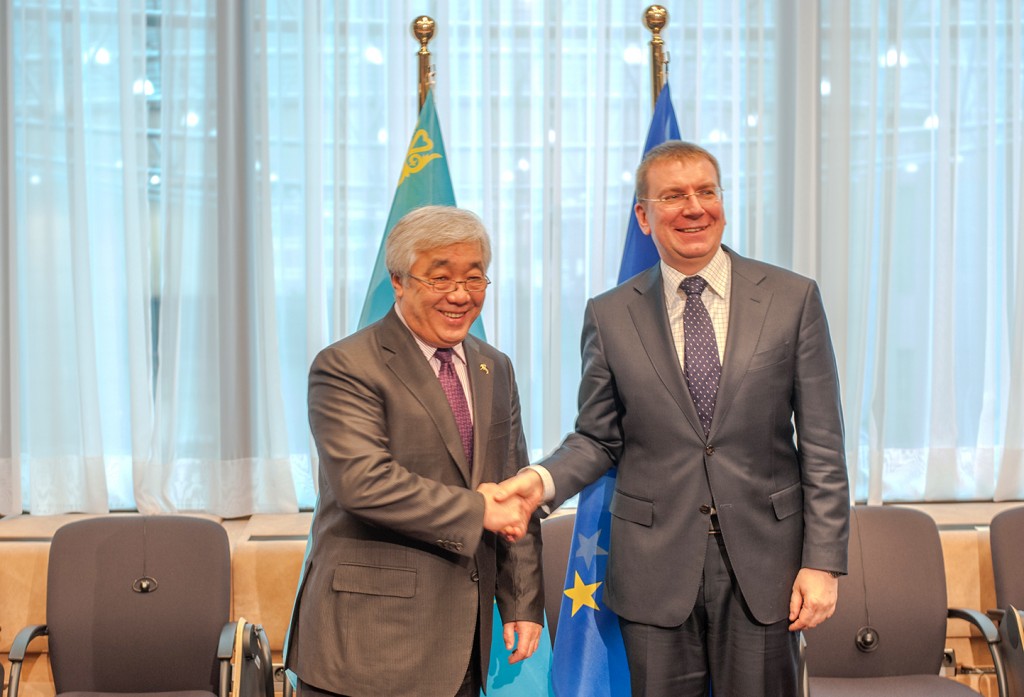BRUSSELS – Foreign Minister Erlan Idrissov of Kazakhstan headed his country’s delegation to the 14th meeting of the Kazakhstan-European Union Cooperation Council in Brussels on March 3. Edgars Rinkēvičs, Minister of Foreign Affairs of Latvia, which holds the EU Council presidency until July 2015, and Alain Le Roy, secretary-general of the European External Action Service, led the EU delegation.
The talks focused both on the growing bilateral relations between Kazakhstan and the European Union and on the new EU Strategy for Central Asia that is currently being developed at the initiative of the Latvian EU presidency.
“The visit of the President of Kazakhstan, Nursultan Nazarbayev, to Brussels in October 2014 further underlined the importance we attach to our relations with Europe. And the November visit to Kazakhstan of Maroš Šefčovič, the vice president of the European Commission for Energy Union, highlighted many opportunities for the further development of mutually beneficial economic cooperation,” Idrissov said, underlining the significance of the completion of negotiations last year on a draft Enhanced Partnership and Cooperation Agreement (PCA) and a document on Kazakhstan’s accession to the World Trade Organisation (WTO).
The Cooperation Council reaffirmed the commitment of both parties to strengthening EU-Kazakhstan relations across a number of areas, discussed a number of issues of international and regional cooperation and confirmed the mutual interest in signing and ratifying the new PCA between Kazakhstan and the European Union as soon as possible, the press service of the European Union reported. During a joint press conference with Idrissov following their talks, Rinkēvičs said the EU side would work towards signing the agreement, which needs to be translated into 22 official languages of the EU, this year.
“We have mutual interest in keeping and widening cooperation between EU and Kazakhstan,” Rinkēvičs said then. “We strongly believe that it reflects our relationship that has reached a more mature state,” he added speaking of the new agreement that will cover 29 areas of cooperation.
Idrissov commended the development of trade and investment cooperation with the EU, while the EU reiterated its support for Kazakhstan’s WTO membership.
“The European Union is Kazakhstan’s largest trading partner, with a dynamically developing trade and investment relationship between us. Total trade turnover in 2014 fell 2.5 percent in comparison to 2013 – a reflection of the challenging times in our respective economies – but this does not detract from the enormous potential for our economic relationship and the extension of ties,” Idrissov stated during the meeting as reported by press service of the Ministry of Foreign Affairs.
“Taking into account very significant trade and economic cooperation between Kazakhstan and the European Union and the role of the European Union as Kazakhstan’s first trading and investment partner in the development and diversification of Kazakhstan’s economy, we agreed that we have a mutual interest in developing cooperation in this vital sphere of our bilateral relations,” Rinkēvičs said at the press briefing.
“On behalf of the European Union, I also reiterated our support for the membership of the Republic of Kazakhstan in the WTO which will help dismantle remaining trade barriers and further boost bilateral trade,” the Latvian foreign minister announced.
“The simplification of the visa regime between Kazakhstan and the EU and the conclusion of the agreement on scientific and technical cooperation and innovation are two areas in particular which could make a significant contribution to enhancing our relationship,” Idrissov said in his turn.
Meanwhile, the Kazakh minister urged European business people to examine business opportunities emerging in the framework of the implementation of the new Nurly Zhol economic policy in transport, industry, energy infrastructure and preparations for EXPO 2017 in Astana.
Delving into the issue of easing visa regimes, Idrissov said their simplification would give an additional impetus to entrepreneurs and investors and lead to an increase in mutual tourism, thus contributing to direct dialogue between people. An important step toward future negotiations on easing the visa regime was the signing of agreements between Kazakhstan and the Benelux countries (Belgium, the Netherlands and Luxembourg) on an exemption from visa requirements for holders of diplomatic passports and on readmission that took place at Brussels airport on March 2. Idrissov urged Latvia, as current chair of the EU Council, to support Kazakhstan’s initiative.
In light of the discussion of the new EU Strategy for Central Asia, the Cooperation Council welcomed Kazakhstan’s involvement in EU regional initiatives for Central Asia. It highlighted the role of regional cooperation in Central Asia as a pillar of conflict prevention and socio-economic development in the region.
 Idrissov confirmed Kazakhstan’s commitment to strengthening cooperation with the EU in a regional format. “We are a strong supporter of the EU’s Strategy for Central Asia and have been actively involved in the policy process. We have provided a memo outlining our views of the EU’s current strategy and our vision of what an updated document and our proposals could look like. We believe that this document and our proposals give the EU a useful perspective on the region’s expectations about the future of the strategy. And we hope it can feed into an updated strategy that will guide a specific programme of regional cooperation that meets the interests of all countries in the region and the EU,” he said.
Idrissov confirmed Kazakhstan’s commitment to strengthening cooperation with the EU in a regional format. “We are a strong supporter of the EU’s Strategy for Central Asia and have been actively involved in the policy process. We have provided a memo outlining our views of the EU’s current strategy and our vision of what an updated document and our proposals could look like. We believe that this document and our proposals give the EU a useful perspective on the region’s expectations about the future of the strategy. And we hope it can feed into an updated strategy that will guide a specific programme of regional cooperation that meets the interests of all countries in the region and the EU,” he said.
As the key areas of future cooperation within the EU’s Strategy for Central Asia, the Kazakh foreign minister primarily distinguished collaboration on regional security issues, including efforts to strengthen cooperation on border management and the fight against drug trafficking, human trafficking, terrorism and extremism.
“… [W]e believe security cooperation between the EU and Central Asia, which takes place primarily through our High Level Dialogue on Security, can be given fresh impetus by a greater focus on producing practical outcomes,” he said. The second meeting of this dialogue is set to take place in Dushanbe, Tajikistan, on March 11-12.
Other areas included developing integrated infrastructure and a transcontinental transport network, particularly developing cooperation with the EU INOGATE (Interstate Oil and Gas Transport Corridor to Europe) and within the framework of the TRACECA (Transport Corridor Europe-Caucasus-Asia), and intensifying cooperation in environmental protection and water management.
“We very much appreciate the role that Kazakhstan plays in the implementation of the European Union’s Strategy for Central Asia,” Rinkēvičs stated at the press briefing. “We discussed the key aspects of the implementation of that strategy taking stock of progress made since the previous Cooperation Council in July 2013.”
“Speaking about … the current discussion of the Central Asian strategy, … we had also very good exchange and we listened very carefully [to] what our partners have told us [about] how they see some issues, be it economic cooperation, be it high-level dialogue on security issues, be it … environment protection, water resources issues. … But I would specifically put emphasis on issues that are related to security, … modernisation efforts, including those of education, those of economic cooperation and cooperation in the energy field,” he added. “Let me conclude by really praising Kazakhstan as being a very active partner in developing that strategy and in implementing that strategy.”
Idrissov also advocated establishing contact between the EU and the Eurasian Economic Union. “One area where we believe there is an important need and opportunity to build relations is between the EU and the Eurasian Economic Union. Establishing a platform for dialogue and cooperation and growing a relationship based on mutual economic benefit would, we believe, be in all of our interests – economic and political,” he said, noting that the initiative had received a positive response from the leadership of Germany, France and other European countries.
Idrissov also informed his European colleagues about Kazakhstan’s upcoming presidential election scheduled for April 26 and invited the European Parliament and other international and inter-parliamentary organisations to participate in the monitoring process.
Asked about the EU’s reaction to this election at the press conference, Rinkēvičs said, “We would definitely hope that … the presidential elections will be held according to the highest international standards and according to the principles of ODIHR [OSCE Office for Democratic Institutions and Human Rights]. Observers from pan-European organisations, like OSCE or many other organisations, would be very helpful to evaluate the overall procedural as well as content issues of the elections.”

